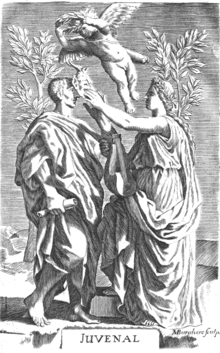
Back Sàtires (Juvenal) Catalan Satiry (Iuvenalis) Czech Sátiras (Juvenal) Spanish Satires (Juvénal) French Satire (Giovenale) Italian Sátiras (Juvenal) Portuguese Сатиры (Ювенал) Russian Satire (Juvenal) Serbo-Croatian Yergiler Turkish
This article contains too many or overly lengthy quotations. (May 2020) |
| Satires | |
|---|---|
| by Decimus Junius Juvenalis | |
 Page from a 1632 manuscript, with Satire 15 and annotations | |
| Original title | Saturae |
| Translator | Niall Rudd Rolfe Humphries Peter Green G. G. Ramsay William Stewart Rose Lamberto Bozzi |
| Written | c. AD 100–127 |
| Country | Roman Empire |
| Language | Latin |
| Genre(s) | Satire |
| Form | 16 poems divided into five books |
| Meter | dactylic hexameter |
| Publication date | 1467 |
| Published in English | 1647 |
| Media type | manuscript |
| Full text | |
The Satires (Latin: Saturae) are a collection of satirical poems by the Latin author Juvenal written between the end of the first and the early second centuries A.D.

Juvenal is credited with sixteen poems divided among five books; all are in the Roman genre of satire. The genre is defined by a wide-ranging discussion of society and social mores in dactylic hexameter.[1] The sixth and tenth satires are some of the most renowned works in the collection.
- Book I: Satires 1–5
- Book II: Satire 6
- Book III: Satires 7–9
- Book IV: Satires 10–12
- Book V: Satires 13–16 (Satire 16 is incompletely preserved)
In a tone and manner ranging from irony to rage, Juvenal criticizes the actions and beliefs of many of his contemporaries, providing insight into value systems and questions of morality as opposed to the realities of Roman life. The author makes constant allusion to history and myth as a source of object lessons or exemplars of particular vices and virtues. Coupled with his dense and elliptical Latin, these references indicate that the intended reader of the Satires was highly educated. The Satires are concerned with perceived threats to the social continuity of the Roman citizens: socially ascendant foreigners, unfaithfulness, and other more extreme excesses of the Roman aristocracy.
Scholarly estimates for the dating of the individual books have varied. It is generally accepted that the fifth book must date to a point after 127, because of a reference to the Roman consul Lucius Aemilius Juncus in Satire 15.[2] A recent scholar has argued that the first book should be dated to 100 or 101.[3] Juvenal's works are contemporary with those of Martial, Tacitus and Pliny the Younger.
- ^ Lucilius – the acknowledged originator of Roman Satire in the form practiced by Juvenal – experimented with other meters before settling on dactylic hexameter.
- ^ E. Courtney, A Commentary on the Satires of Juvenal (London, 1980), pp. 1–2.
- ^ J. Uden, The Invisible Satirist: Juvenal and Second-Century Rome (Oxford, 2015), pp. 219–226
© MMXXIII Rich X Search. We shall prevail. All rights reserved. Rich X Search